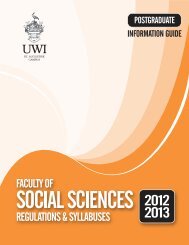Faculty of Humanities and Education (Postgraduate) - The University ...
Faculty of Humanities and Education (Postgraduate) - The University ...
Faculty of Humanities and Education (Postgraduate) - The University ...
You also want an ePaper? Increase the reach of your titles
YUMPU automatically turns print PDFs into web optimized ePapers that Google loves.
POSTGRADUATE REGULATIONS & SYLLABUSES 2012 - 2013<br />
THE FACULTY OF HUMANITIES & EDUCATION<br />
Aims/Goals<br />
<strong>The</strong> major aims <strong>of</strong> this course are to develop teachers who can<br />
expertly diagnose, plan, <strong>and</strong> assess instruction for different<br />
types <strong>of</strong> learner in a variety <strong>of</strong> contexts.<br />
General objectives<br />
To achieve these aims, course participants will have the<br />
opportunity to:<br />
• Demonstrate knowledge <strong>of</strong>, <strong>and</strong> a disposition to use,<br />
instructional methods appropriate for teaching English in<br />
diverse contexts<br />
• Plan lessons that motivate their students to learn about<br />
<strong>and</strong> use language accurately <strong>and</strong> creatively<br />
• Make appropriate use <strong>of</strong> technology to meet instructional<br />
objectives<br />
• Demonstrate a positive disposition to the instructional<br />
<strong>and</strong> motivational possibilities afforded by educational<br />
technology<br />
• Demonstrate knowledge <strong>of</strong>, <strong>and</strong> disposition to apply,<br />
appropriate learning management, including classroom<br />
management, strategies for diverse contexts<br />
• Engage in continuous reflection on pedagogical issues<br />
applied to teaching <strong>of</strong> English.<br />
<strong>The</strong> tools provided by the MyElearning platform will be a major<br />
teaching/learning resource.<br />
Assessment<br />
Coursework 100%<br />
Assessment Methods<br />
This course uses both formative <strong>and</strong> summative assessment<br />
methods. Each student will be required to create individual<br />
projects (75%) <strong>and</strong> submit a sample <strong>of</strong> their reflective journal<br />
entries (25%). <strong>The</strong> projects are designed to assess course<br />
participants’ underst<strong>and</strong>ing <strong>and</strong> assimilation <strong>of</strong> core content.<br />
Journal entries will <strong>of</strong>fer evidence <strong>of</strong> course participants’<br />
evolving underst<strong>and</strong>ings <strong>of</strong> course content.<br />
Resources:<br />
• Multimedia classroom equipment<br />
• Access to computer lab<br />
• <strong>The</strong> Internet<br />
• MyElearning MOODLE course shell<br />
Recommended texts<br />
Gronlund, N.E., & Brookhart, S.M. (2009). Gronlund’s writing<br />
instructional objectives (8 th ed.). New Jersey: Pearson.<br />
Nippold, M.A. (1998). Later language development. <strong>The</strong> school age<br />
<strong>and</strong> adolescent years. (2 nd ed.). Austin, Texas: Pro. Ed.<br />
Selected Readings<br />
Cheng, Y., & Yeh, H. (2009). From concepts <strong>of</strong> motivation to<br />
its application in instructional design: Reconsidering<br />
motivation from an instructional design perspective.<br />
British Journal <strong>of</strong> <strong>Education</strong>al Technology, 40(4), 597-605.<br />
doi:10.1111/j.1467-8535.2008.00857.x.<br />
Christenberry, L., Bomer, R., & Smagorinsky, P. (Eds.) (2009).<br />
H<strong>and</strong>book <strong>of</strong> adolescent literacy research. NY: Guilford Press.<br />
Cosset Lent, R. (2006). Engaging adolescent learners: A guide for<br />
content area teachers. London: Heinemann.<br />
Craig, D. (2006). Teaching language <strong>and</strong> literacy to Caribbean<br />
students. From vernacular to St<strong>and</strong>ard English. Kingston,<br />
Jamaica: Ian R<strong>and</strong>le.<br />
Grant, J., & Hollas, B. (2002). Differentiated instruction: Different<br />
strategies for different learners. Peterborough, New<br />
Hampshire: Crystal Springs Books.<br />
Green, T.D., Brown, A.H., & Robinson, L.K. (2007). Making the most<br />
<strong>of</strong> the web in your classroom: A teacher’s guide to blogs,<br />
podcasts, wikis, pages, <strong>and</strong> sites. Thous<strong>and</strong> Oaks, CA: Corwin<br />
Press.<br />
Gregory, G.H. & Chapman, C.M. (Eds.). (2006). Differentiated<br />
instructional strategies: One size doesn’t fit all. Thous<strong>and</strong><br />
Oaks, CA: Corwin Press.<br />
Hinchman, K., & Sheridan-Thomas, H. K. (2008). Best practices in<br />
adolescent literacy instruction. NY: Guilford Press.<br />
Karten, T.J. (2009). Inclusion strategies that work for adolescent<br />
learners! Thous<strong>and</strong> Oaks, CA: Corwin Press.<br />
Orlich, D.C., Harder, R.J., Callahan, R.C., Trevisan, M.S., & Brown, A.H.<br />
(2009). Teaching strategies: A guide to effective instruction.<br />
(9 th ed.). Belmont, CA: Wadsworth.<br />
Additional References<br />
Applebee, A.N. (1989). <strong>The</strong> teaching <strong>of</strong> literature in programs with<br />
reputations for excellence in English. State <strong>University</strong> <strong>of</strong> New<br />
York, Albany.<br />
Applebee, A. N., Langer, J.A., Nystr<strong>and</strong>, M., & Gamoran, A. (2003).<br />
Discussion-based approaches to developing underst<strong>and</strong>ing:<br />
Classroom instruction <strong>and</strong> student performance in middle<br />
<strong>and</strong> high school English. American <strong>Education</strong>al Research<br />
Journal, 40(3), 685-730.<br />
Carbonaro, W.J., & Gamoran, A. (2002). <strong>The</strong> production <strong>of</strong><br />
achievement inequality in high school English. American<br />
<strong>Education</strong>al Research Journal, 39(4), 801-827.<br />
Gamoran, A., & William C. (2002-2003). High school English: A<br />
national portrait. <strong>The</strong> High School Journal 86, 1-13.<br />
Grossman, P. L. (1990). A study in contrast: Sources <strong>of</strong> pedagogical<br />
content knowledge for secondary English. Journal <strong>of</strong><br />
Teacher <strong>Education</strong>, 40 (5), 24-31.<br />
Grossman, P.L. (1990). <strong>The</strong> making <strong>of</strong> a teacher: Teacher knowledge<br />
<strong>and</strong> teacher education. NY: Teachers College Press. CA:<br />
Wadsworth.<br />
67

















